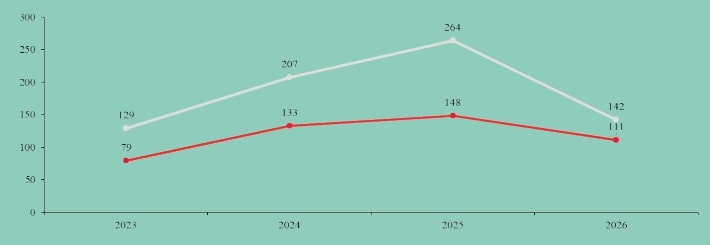The next couple of years will be quite burdensome for the Italian rail freight industry as traffic along many lines will have to be interrupted for upgrade works. Just throuhgout 2024, 60 per cent of the Italian rail lines will be subject to partial or total closure, for a total of 4,100 days.
Over 200 lines will be involved in such projects, with the number expected to grow to over 260 in 2025. If we would sum up the days during which all these lines will be completely closed throughout this year, the total is 2,900 days. When it comes to partial closures, meaning that at least one track of the line will be available, the number of total days is 1,200.
The Codogno-Mantova line, southeast of Milan, will be closed for 349 days, making it the longest closure of 2024. Moreover, the Foggia-Potenza line, west of Naples, will be closed for 190 days. In addition, the Isernia-Campobasso and the Rome-Naples lines, also in the south, will all be closed for 160 days each.
Fermerci’s Annual Report
These numbers were shared in the 2024 Annual Report compiled by the Italian largest rail freight association Fermerci. Of the 207 lines that will see traffic interruptions in 2024, 133 will have an impact on rail freight above 50 per cent. “This means that 50 per cent of the network capacity is not available”, explained Giuseppe Rizzi, Fermerci’s general manager. Next year, the numbers will respectively increase to 264 and 148, while in 2026 there should be a slight decrease (142 and 111). “The situation will be back to normality only in 2027”, he said.

Rizzi added that the association has been urging institutions to implement a fund to compensate rail freight operators that cannot run trains due to infrastructure upgrade works. It needs to be noted that infrastructure upgrades are not the only current constraint for the Italian rail freight sector. For a good part of 2023 and (at least) most of 2024, Italy had to, and will have to, deal with the total closure of the Frejus Railway and a half-regime Gotthard Base Tunnel.
Not only emissions: rail freight saves energy too
Another interesting point raised in Fermerci’s Annual Report is that rail freight does not only pollute less than road transport, but it also consumes significantly less energy. As it is widely known, one freight convoy equals roughly 50 trucks. The Report mentioned that using the rail would save up to 272 ktoe (tonne of oil equivalent). In more concrete terms, this translates into a 75 to 85 per cent lower energy consumption.
Also read: